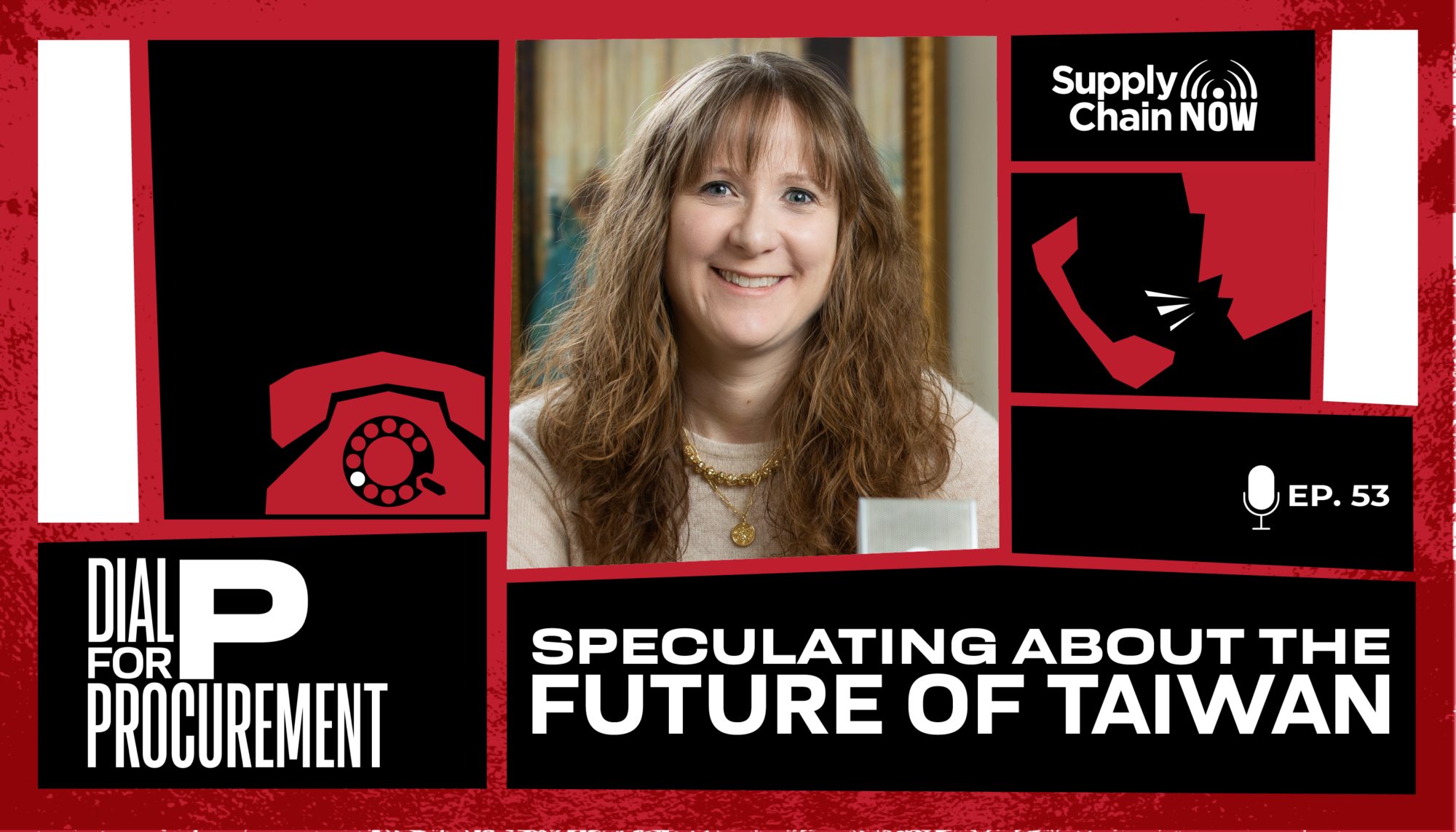Intro/Outro (00:01):
Welcome to Dial P for procurement, A show focused on today’s biggest spin supplier and contract management related business opportunities. Dial P investigates the nuanced and constantly evolving boundary of the procurement supply chain divide with a broadcast of engaged executives, providers, and thought leaders. Give us an hour and we’ll provide you with a new perspective on supply chain value. And now it’s time to dial P for procurement.
Kelly Barner (00:31):
The world is so complicated today. We could play the what if game all day long. What if the railroad workers push back? What if retailers can’t shed all of that unwanted inventory? What if Ukraine starts to lose ground? What if China invades Taiwan? See now there’s one where we actually have some evidence to look at. Hong Kong has led the way on July 1st, 1997, sovereignty over the city of Hong Kong transferred from the United Kingdom to China. The events that followed give us more than enough to project what Taiwan might be able to expect if they were to become part of the People’s Republic of China. In this episode of Dial P, I’m going to review what was supposed to happen in the years following the transfer of Hong Kong to China, how the actual course of events impacted Hong Kong’s citizens economy and press a current news story that is placing Hong Kong back in the headlines and what all of this may mean for Taiwan and therefore to our global supply chains.
Kelly Barner (01:51):
But before I go any further, let me introduce myself. I’m Kelly Barner. I’m co-founder and managing Director of Buyers Meeting Point. I’m the head of operations and content at Art of Procurement, and I’m your host for Dial P here on supply Chain. Now, I’m constantly scanning the news for complex topics to discuss things that are interesting, but which may escape people’s notice. Dial P releases a new podcast episode or interview every Thursday, so be the lookout for future episodes and don’t forget to check out past episodes as well. Now, before we get back to today’s topic, I have a quick favor to ask. I hope you find value in the time we’re about to spend together. If you do find a way to engage, we have listeners on all kinds of platforms. Give us a review on iTunes, subscribe on Spotify, give us a share or a like on LinkedIn or Twitter.
Kelly Barner (02:54):
You can even send this episode directly to a colleague that you think will find it interesting. As always, I am grateful for your interest and attention to what we’re building here at Dial P. Now, let me start by giving you a quick reminder of why Taiwan’s freedom is so important to global business. According to data from the SIA and bcg, Taiwan is the world leader in semiconductor fab capacity at 22%, but that’s capacity when it comes to actual production. Taiwan produces 63% of the world’s semiconductors and just one company there. TSMC holds 53% of the global market share. According to the US Department of Commerce, 12% of chips are manufactured in the United States, and so we are therefore dependent on Taiwan for semiconductor production, and semiconductors are in everything. If you’re interested in more about that, listen to episode 36 of Dial P where I focused exclusively on the CHIPS act.
Kelly Barner (04:09):
Now, over the last couple of years, there has been increased global uncertainty about China’s willingness to allow Taiwan to remain independent. Call it a global what if game. Now, I’m the first one to be honest. Air quotes are terrible practice in audio content, but some of the sources that I’m pulling from today clearly involve something that feels a little more like propaganda. The news, for example, we’ll get to the specifics of this in a minute, but the use of the term patriot to designate Hong Kong politicians that are friendly to China, there’s clearly a bias to that. So hopefully heard my air quotes in Patriot. This is an active listening kind of podcast, if you know what I mean. This whole issue with China, Hong Kong, and Taiwan stems back to the 1980s when Chinese leader de Shing purchased a national unification policy where he wanted to bring Taiwan, Hong Kong and Macau back under the sovereignty of China, Macau and Hong Kong.
Kelly Barner (05:17):
Our real quotes, special administrative regions of China, Taiwan, to this point anyway, remains independent, but what does it mean to be a special administrative region of China? Well, for one thing, it means your laws are different than those on mainland China. When the UK handed Hong Kong back to China in July of 1997, ending 156 years of British rule, China and the UK both signed the declaration. Under that agreement, China was supposed to leave Hong Kong’s governmental and economic structures in place for 50 years that would’ve gotten them to 2047. They called this Policy one Country two Systems. It’s a little bit like the strategic ambiguity. The US employees in dealing with Taiwan so is not to anger China. The terms of the declaration held until about 20, 20, 23 years, not quite halfway through the 50 year agreement between China and the uk. Now in 2019, pro-democracy demonstrations began especially amongst students in Hong Kong.
Kelly Barner (06:36):
Now, 2019 is when the world really took notice, but there were also protests in 2003, just six years after the transfer, 2011 and 2014. The 2019 protests were in response to a law that would have allowed extradition of Hong Kong citizens to mainland China for trial. The fear was that China would use it to silence voices of dissent and then move them to China for trial. Huge public protests followed estimates range from hundreds of thousands to millions of people marching in the streets. A risky move under the circumstances. That extradition proposal was withdrawn in September of 2019, but it was too late. The damage was done and trust between the leaders of Hong Kong and the people living there had been eroded. Making matters worse, local law enforcement attempted to quell the crowds with practices that are not generally acceptable according to international norms and standards as reported in Forbes.
Kelly Barner (07:50):
Now, this was followed by a national security law in 2020. The stated goal of this law was to prevent sedition and collusion using very broad air quotes. Chinese determined definitions of both words. Since the handover in 1997, there have been no free votes with universal suffrage to select a leader of Hong Kong. Their election committee is made up of professional elites, most of whom are appointed by people in Beijing. As of 2021, only air quotes Patriots who also air quotes, respect the CCP can run for office in Hong Kong. There’s some of that positioning we talked about earlier. Part of my concern and something that should concern everyone in business, even if not as humans, is the clear death of freedom of the press in Hong Kong. The Apple Daily has received the most coverage on this front. They were an independent newspaper whose assets were frozen by the government, whose headquarters were rated by police, and then multiple people who worked there, including owner Jimmy Lie, were arrested for endangering national security.
Kelly Barner (09:15):
The Apple Daily went out of print in June of 2021 In December of 2021, stand News, another pro-democracy paper closed and more journalists were arrested. Yet another citizen News closed in January of 2022. According to the Press Freedom Index, which is run by Reporters Without Borders ranked Hong Kong number 1 48 out of 180 countries in terms of their press freedom in 2021, that’s the most recent year of the report. As a point of comparison, North Korea is last in a hundred and 80th place. In 2002, the first year of data I could access Hong Kong was ranked 18th. That’s just one place behind the United States. So between 2002 and 2021, they fell from 18th to 140 eighth. In 2002, Taiwan was ranked 35th. Now they’re in 43rd. They’re already moving in the wrong direction. I mentioned that a current trial is bringing freedom of the press in Hong Kong back into the spotlight.
Kelly Barner (10:33):
Jimmy Ly, who I mentioned, the owner of Apple Daily is currently on trial under the National Security Law. This trial is literally unfolding day by day right now, so I’m gonna date this. I’m recording this episode on Monday, December 5th at 9:00 PM Eastern. Last week, he got court approval for a British lawyer to represent him in court. His trial was supposed to start on December 1st, but it was postponed at the last minute. Hong Kong’s immigration department refused to expend the lawyer’s work visa, so now the trial is on hold and Jimmy Ly remains in prison. General opinion is that he is likely to be found guilty. Wall Street Journal opinion columnist William McGurn, a friend of Jimmy Lies fully expects him to be found guilty and he faces life in prison. Obviously, this is absolutely devastating for Jimmy Lie, but it’s also a bad sign for all of Hong Kong.
Kelly Barner (11:42):
Now, how would we feel if this same thing were happening in Taiwan? Would we still be comfortable with their semiconductors going into our phones and cars? Now, let me turn from the press to focus on the potential economic impact of a Chinese takeover. In 2020, Hong Kong lost their special trading status with the United States because they no longer had the requisite autonomy from China. Companies are moving out of the city in droves US companies with a regional base in Hong Kong. Were at an 18 year low in 2021 and half of European companies who have locations in the city plan to pull out to some extent, again, in quotes by 2023. All of this, of course, is leading to increased economic dependence upon China ultimately furthering their goal of pulling the city into their orbit. Hong Kong’s best financial and economic advantage is being able to serve as a go between between China and the West, even without their most favored nation trading status.
Kelly Barner (12:56):
The economic situation in Hong Kong isn’t bad, but it’s hard to get a clear picture. First of all, based on the unprecedented last three years globally, but also as Hong Kong’s economy and stock market become more and more closely tied to China’s, their fortunes will rise and fall in lockstep. A recent Wall Street Journal article titled Hong Kong’s Stock Market is On A Wild Ride, pretty much sums it up right in the title. Uncertainty is the only thing we can be certain of. Now, to be fair, none of this is a conclusion. In fact, the protests currently going on in China are some of the biggest that have been seen. Beijing, Shanghai, and Jang have all seen large demonstrations. One particular rallying cry is based on a quarantine that saw people physically confined to a building, which then caught fire leading to 10 deaths at least according to state run media.
Kelly Barner (14:05):
The World Cup has been a flash point as well. Reports say that TV coverage in China has been changing to conceal the extent to which the rest of the world has kind of gone back to normal. While people in China are still struggling under lockdowns, we’re also seeing what is being called the A four revolution blank paper protests in response to harsh government lockdowns people in China understand the connection between freedom of speech and quality of life, just as we’ve discussed in Hong Kong. So what does all this mean? Now? What we don’t know is if China would consider a military takeover or if they would do something more passive. We do know we need to keep watching, and the takeaways from all of this impact us very personally. First and foremost, it seems fair to acknowledge that the privileges we enjoy in the United States, none of which we will retain if we do not exercise them truly are privileges when seen in a global perspective, even if some kind of suitable arrangement can be reached.
Kelly Barner (15:21):
For Taiwan, the violation of the agreement to preserve Hong Kong’s societal structures for 50 years didn’t last very long at all. Why would this be different? That declaration ended up being worth no more than the letter that never Chamberlain brought back to England from Nazi Germany, and I really do think there’s a close connection between economic prosperity and press freedom. Once the press is no longer free. We can’t trust anything coming out of the country. In the case of Taiwan, do we really wanna be negotiating contracts with suppliers for semiconductors? If we can’t trust their data, what kind of supply chain transparency or agility will we have then? Now, that’s my point of view, but as always, I want to know what you think. Does the case of Hong Kong give us reason to feel concern about Taiwan? Will Jimi’s trial help people make the connection between these two special administrative regions and what does all of this mean supply chain professionals should be watching and planning for today? There is a lot to think about here and even more to watch, so stay tuned. Until next time, I’m Kelly Barner. On behalf of Dial P and the whole team here at Supply Chain now, thank you is always for listening, and have a great rest of your day.
Intro/Outro (16:56):
Thank you for joining us for this episode of Dial P four procurement and for being an active part of the supply chain Now community. Please check out all of our shows and events@supplychainnow.com. Make sure you follow Dial P four procurement on LinkedIn, Twitter, and Facebook to catch all the latest programming details. We’ll see you soon for the next episode of Dial P four. Procurement.



